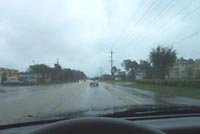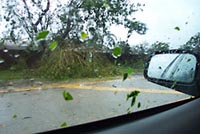| The keys to coming
through a hurricane with minimal mental stress and physical
damage are Planning Ahead and Preparation.
Here is some information and links to help.
First of all you
must decide whether you are going to evacuate or ride
it out.
Even if you are planning
to ride it out, it's still a good idea to be prepared to
evacuate if you need to. It's quite all right to let your
survival instincts take over if you feel the desire to
run. Nobody is going to know or care how bravely you died
if you decide to ride out a Category
5 hurricane in your
mobile home.
The timing of your
decision to evacuate is very important - when the roof
blows off the house and the walls start to cave in it's
a bit late to get on the road.
<<< SideNote: Lesson
Learned - gas up the car early. Whether you go
or stay you will need gas eventually. Lines will be
long and then gas will not be available at all for
days before, during and after the storm. Even if your
area isn't hit, trucking can be disrupted, cutting
off the supply lines. >>>
 Evacuate Evacuate I'm
not really big on evacuating ... I was a young child when
we evacuated for hurricane Donna in 1960. The storm chased
us right up the center of the state and overtook us. My
parents ended up pushing our stalled car through waist
deep water in a strange town in the middle of a hurricane
(in the middle of the night) to get us to an already overcrowded
public shelter.
During
the storms of '04 & '05 we saw the nightmare of heavy
traffic, no gas, and price gouging as people tried to escape
the danger area.
I'd
rather stay home, thank you very much, but I still keep
an evacuation kit ready in case I change my mind.
 If
you are going to evacuate don't wait until the last minute. You
will find the shelters full, traffic heavy and drivers tense,
hotels fully booked, and bad weather making everything worse.
Planning ahead will really help make your experience less traumatic. If
you are going to evacuate don't wait until the last minute. You
will find the shelters full, traffic heavy and drivers tense,
hotels fully booked, and bad weather making everything worse.
Planning ahead will really help make your experience less traumatic.
If
you live in a mobile home, evacuate immediately. Mobile
home parks are magnets for hurricanes and tornadoes.
Those anchors you have tying your mobile home to the
ground are not going to help you in a real storm. Get
out. Get out immediately!
Where
will you go? Where you plan to go will determine
what you put into your evacuation kit. You have several
options: |


